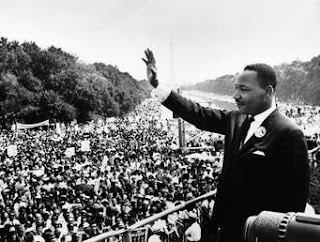Dr. Martin Luther King, Jr. believed there was something holy
and sacred about America’s founding. He obviously considered the Jim Crow south,
where he lived and worked, to be a sharp departure from America’s founding
vision. Writing in 1963 from the Birmingham city jail, Dr. King declared,
Our destiny is tied up
with the destiny of America . . . We will win our freedom because the SACRED
HERITAGE of our nation and the eternal will of God are embodied in our echoing
demands.
Frederick Douglass
(1816-1895), the former slave and passionate abolitionist, came to the same
conclusion 100 years before Dr. King. In his early years, Douglass felt he had no
part in America; but after years of investigation and research he completely changed
his thinking. In a July 4th speech in 1852, Douglass called the U.S. Constitution “a
glorious liberty document,” and declared,
Fellow
Citizens, I am not wanting in respect for the fathers of this republic. The
signers of the Declaration of Independence were brave men. They were great men
too—great enough to give fame to a great age. It does not often happen to a
nation to raise, at one time, such a number of truly great men.
Slavery was just not an issue, not
even among intellectuals, much less among political leaders, until the 18th century–and then it was an issue only in Western civilization. Among those who
turned against slavery in the 18th century were George Washington,
Thomas Jefferson, Patrick Henry and other American leaders. You could research
all of 18th century Africa or Asia or the Middle East without
finding any comparable rejection of slavery there (Hyatt, 1726:
The Year that Defined America, 90).
History
shows that it was a great Christian Awakening (1726-1770) in Colonial America that breached
racial and cultural barriers and unleashed anti-slavery outrage throughout the Colonies.
This Awakening resulted in virtually every Founding Father, even
those who owned slaves, taking a public stand against it.
By the time of the writing of the
Declaration of Independence in 1776 and the Constitution in 1787, virtually
every Founder agreed with John Adams, America’s 2nd president, who
declared,
Every measure of prudence ought to be
assumed for the eventual total extirpation of slavery from the United States. I have throughout my
whole life held the practice of slavery in abhorrence
As
a result, America’s founders formulated founding documents that contain no
classifications based on race or skin color. The words “slave” and “slavery”
are nowhere to be found. Instead, the Constitution speaks of “citizens,” “persons,”
and “other persons.”
Indeed, America’s founding generation
understood America’s founding documents to be anti-slavery documents. Douglass came
to this realization and wrote, “Anyone
of these provisions in the hands of
abolition statesmen, and backed by a right moral sentiment, would put an end to
slavery in America” (Hyatt, Abolitionist Founding Fathers, 54-55).
Dr. King understood this original American dream of faith and freedom, which is why, in his iconic “I Have a Dream Speech,” he could say, “I still have a dream; it is a dream deeply rooted in the American dream.” He then declared,
When the architects of our Republic wrote the magnificent words of the Constitution and the Declaration of
Independence, they were signing a promissory note to which every American was to fall heir. This note was a promise
that all men, yes, black men as well as white men, would be guaranteed the
"unalienable Rights" of "Life, Liberty and the pursuit of Happiness."
Dr. King made it clear that the problem the nation faced was not with her founding documents, but with the fact that succeeding generations had not lived up to the vision of equality and liberty the Founders had enshrined in those documents. He went on to say,
I have a dream that one day
this nation will rise up and live out the true meaning of its creed: "We
hold these truths to be self-evident, that all men are created equal.”
In my book, 1726: The Year that Defined America, I have shown how the Great Awakening (1726-70) revitalized
Christian faith throughout the colonies, ignited an anti-slavery movement, and had a direct bearing on the founding of the nation and the formulation of her colorblind, anti-slavery founding documents.
Dr. King obviously knew this, which is why he did not rail against America's Founders, but sought to build on their legacy and the "Sacred Heritage" that they left. Let's pray that this current "woke" generation will learn from him and follow his example.
This article is derived from Dr. Eddie Hyatt’s books, 1726: The Year that Defined America and Abolitionist Founding Fathers, available from Amazon and his website at www.eddiehyatt.com.


No comments:
Post a Comment